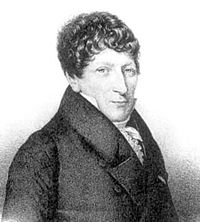
Jean Nicolas Pierre Hachette
Encyclopedia

France
The French Republic , The French Republic , The French Republic , (commonly known as France , is a unitary semi-presidential republic in Western Europe with several overseas territories and islands located on other continents and in the Indian, Pacific, and Atlantic oceans. Metropolitan France...
mathematician
Mathematician
A mathematician is a person whose primary area of study is the field of mathematics. Mathematicians are concerned with quantity, structure, space, and change....
, was born at Mézières
Mézières
Mézières can refer to:People*Jean-Claude Mézières, French comic book artist*Rob De Mezieres, South African writer and director*Nicolas Le Camus de Mézières , French architect and theoretician*Philippe de Mézières Mézières can refer to:People*Jean-Claude Mézières, French comic book artist*Rob De...
, where his father was a bookseller.
For his early education he proceeded first to the college of Charleville
Charleville-Mézières
Charleville-Mézières is a commune in northern France, capital of the Ardennes department in the Champagne-Ardenne region. Charleville-Mézières is located on the banks of the Meuse River.-History:...
, and afterwards to that of Reims
Reims
Reims , a city in the Champagne-Ardenne region of France, lies east-northeast of Paris. Founded by the Gauls, it became a major city during the period of the Roman Empire....
. In 1788 he returned to Mézières, where he was attached to the school of engineering as draughtsman to the professors of physics and chemistry. In 1793 he became professor of hydrography
Hydrography
Hydrography is the measurement of the depths, the tides and currents of a body of water and establishment of the sea, river or lake bed topography and morphology. Normally and historically for the purpose of charting a body of water for the safe navigation of shipping...
at Collioure
Collioure
Collioure is a commune in the Pyrénées-Orientales department in southern France.It lies on the Mediterranean and was a part of the ancient Roussillon province....
and Port-Vendre. While there he sent several papers, in which some questions of navigation were treated geometrically, to Gaspard Monge
Gaspard Monge
Gaspard Monge, Comte de Péluse was a French mathematician, revolutionary, and was inventor of descriptive geometry. During the French Revolution, he was involved in the complete reorganization of the educational system, founding the École Polytechnique...
, at that time minister of marine, through whose influence he obtained an appointment in Paris.
Towards the close of 1794, when the Ecole Polytechnique was established, he was appointed along with Monge over the department of descriptive geometry
Descriptive geometry
Descriptive geometry is the branch of geometry which allows the representation of three-dimensional objects in two dimensions, by using a specific set of procedures. The resulting techniques are important for engineering, architecture, design and in art...
. There he instructed some of the ablest Frenchmen of the day, among them SD Poisson, François Arago
François Arago
François Jean Dominique Arago , known simply as François Arago , was a French mathematician, physicist, astronomer and politician.-Early life and work:...
and A Fresnel. Accompanying Guyton de Morveau in his expedition, earlier in the year, he was present at the battle of Fleurus
Battle of Fleurus (1794)
In the Battle of Fleurus on 26 June 1794, the army of the First French Republic under General Jean-Baptiste Jourdan faced the Coalition Army commanded by Prince Josias of Coburg in the most decisive battle of the Flanders Campaign in the Low Countries during the French Revolutionary Wars...
, and entered Brussels
Brussels
Brussels , officially the Brussels Region or Brussels-Capital Region , is the capital of Belgium and the de facto capital of the European Union...
with the French army.
In 1816, on the accession of Louis XVIII
Louis XVIII of France
Louis XVIII , known as "the Unavoidable", was King of France and of Navarre from 1814 to 1824, omitting the Hundred Days in 1815...
, he was expelled from his chair by government. He retained, however, till his death the office of professor in the faculty of sciences in the Ecole Normale, to which he had been appointed in 1810. The necessary royal assent was in 1823 refused to the election of Hachette to the Académie des Sciences, and it was not till 1831, after the Revolution
French Revolution
The French Revolution , sometimes distinguished as the 'Great French Revolution' , was a period of radical social and political upheaval in France and Europe. The absolute monarchy that had ruled France for centuries collapsed in three years...
, that he obtained that honour. He died at Paris on the 16th of January 1834.
Hachette was held in high esteem for his private worth, as well as for his scientific attainments and great public services. His labours were chiefly in the field of descriptive geometry, with its application to the arts and mechanical engineering. It was left to him to develop the geometry of Monge, and to him also is due in great measure the rapid advancement which France made soon after the establishment of the École Polytechnique in the construction of machinery.
Hachette's principal works are:
- Deux Suppléments à la Géométrie descriptive de Monge (1811 and 1818)
- Éléments de géométrie à trois dimensions (1817)
- Collection des épures de géométrie, etc. (1795 and 1817)
- Applications de géométrie descriptive (1817)
- Traité de géométrie descriptive, etc. (1822)
- Traité élémentaire des machines (1811)
- (1804-1815)
He also contributed many valuable papers to the leading scientific journals of his time. For a list of Hachette's writings see the Catalogue of Scientific Papers of the Royal Society of London; also F Arago, Œuvres (1855); and Silvestre
Silvestre de Sacy
Antoine Isaac, Baron Silvestre de Sacy , was a French linguist and orientalist. His son, Ustazade Silvestre de Sacy, became a journalist.-Early life:...
, Notice sur J. N. P. Hachette (Brussels, 1836).

